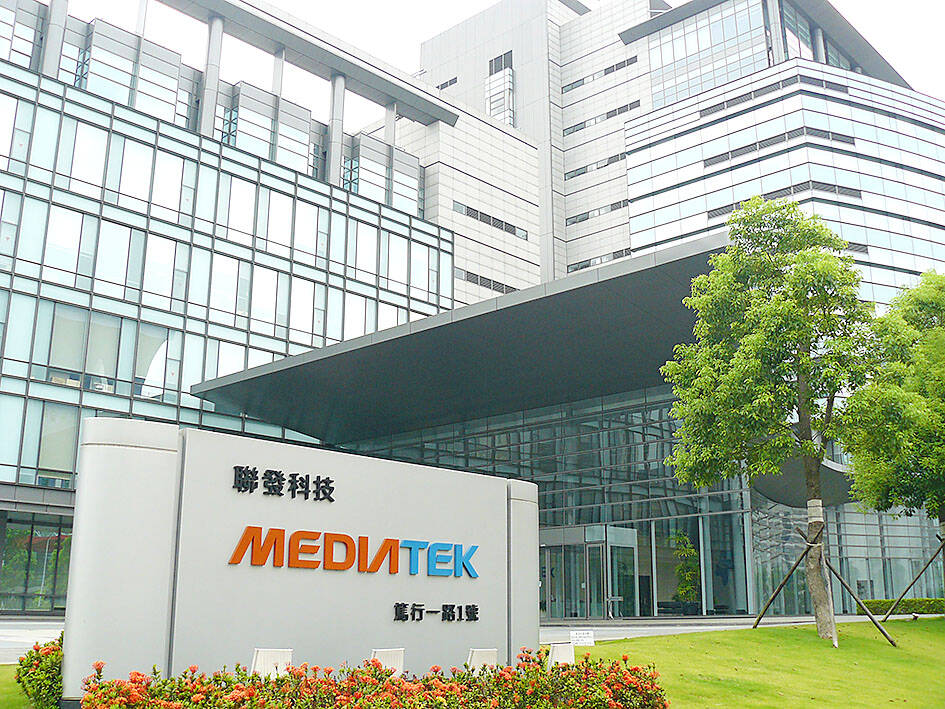Chip designer MediaTek Inc (聯發科) yesterday reported its best profit in five quarters, thanks to stronger-than-expected demand for its flagship smartphone chips.
Net profit last quarter jumped 38.9 percent sequentially and 38.8 percent annually to NT$25.66 billion (US$819.8 million), as its gross margin improved to 48.3 percent from 47.4 percent the previous quarter and 48.3 percent a year earlier.
On an annual basis, however, net profit slid 34.8 percent to NT$76.98 billion from NT$118.14 billion in 2022.

Photo: CNA
Earnings per share dropped to NT$48.51 from NT$74.95 the prior year, although the figure remains the third-highest in the company’s history, it said.
Gross margin last year slid to 47.8 percent from 49.4 percent in 2022, MediaTek said.
The Hsinchu-based company expects a “year of growth” this year, driven by its flagship smartphone chips.
Flagship smartphone chip revenue is expected to see “very strong” double-digit percentage growth this year on an annual basis, following last year’s 70 percent growth to more than US$1 billion, MediaTek said.
Gross margin is estimated to reach between 45.5 percent and 48.5 percent, the company said.
“We also observe that generative artificial intelligence [AI] is driving smartphone upgrades and creating a bigger market for flagship and high-end smartphones,” MediaTek CEO Rick Tsai (蔡力行) said at a teleconference. “The continuous 5G migration and market share expansion of our flagship chips will be key drivers for our mobile phone business this year.”
Chinese smartphone vendors Oppo Mobile Telecommunications Corp (歐珀), Xiaomi Corp (小米) and iQoo adopted MediaTek’s flagship Dimensity 9300 chip for their premium phones with generative AI features, Tsai said.
The company also extended generative AI to its premium segment with Dimnesity 8300, he said.
As the company continues to explore new growth engines, it expects several new businesses to begin volume production from late next year, he said.
With that, MediaTek sees this year as the beginning of its next growth trajectory, he added.
The company expects global smartphone shipments this year to grow at a low-single-digit percentage to 1.2 billion units, with 5G models’ penetration rate climbing to the low-60s from a high 50s in terms of percentage last year.
The company’s revenue this quarter is forecast to grow between 27 and 35 percent annually to between NT$121.8 billion and NT$129.6 billion, as inventories return to normal throughout the supply chain, it said.
Sequentially, revenue this quarter would be flat to down 6 percent from NT$129.56 billion last quarter. Mobile phone chips made up about 64 percent of last quarter’s revenue, the company said.
MediaTek yesterday promoted chief financial officer David Ku (顧大為) to double as a chief operating officer (COO), together with Joe Chen (陳冠州), ushering in a corporate structure with two COOs supervising its operations.
The personnel adjustments take effect today.

SELL-OFF: Investors expect tariff-driven volatility as the local boarse reopens today, while analysts say government support and solid fundamentals would steady sentiment Local investors are bracing for a sharp market downturn today as the nation’s financial markets resume trading following a two-day closure for national holidays before the weekend, with sentiment rattled by US President Donald Trump’s sweeping tariff announcement. Trump’s unveiling of new “reciprocal tariffs” on Wednesday triggered a sell-off in global markets, with the FTSE Taiwan Index Futures — a benchmark for Taiwanese equities traded in Singapore — tumbling 9.2 percent over the past two sessions. Meanwhile, the American depositary receipts (ADRs) of Taiwan Semiconductor Manufacturing Co (TSMC, 台積電), the most heavily weighted stock on the TAIEX, plunged 13.8 percent in

A wave of stop-loss selling and panic selling hit Taiwan's stock market at its opening today, with the weighted index plunging 2,086 points — a drop of more than 9.7 percent — marking the largest intraday point and percentage loss on record. The index bottomed out at 19,212.02, while futures were locked limit-down, with more than 1,000 stocks hitting their daily drop limit. Three heavyweight stocks — Taiwan Semiconductor Manufacturing Co (TSMC, 台積電), Hon Hai Precision Industry Co (Foxconn, 鴻海精密) and MediaTek (聯發科) — hit their limit-down prices as soon as the market opened, falling to NT$848 (US$25.54), NT$138.5 and NT$1,295 respectively. TSMC's

TARIFFS: The global ‘panic atmosphere remains strong,’ and foreign investors have continued to sell their holdings since the start of the year, the Ministry of Finance said The government yesterday authorized the activation of its NT$500 billion (US$15.15 billion) National Stabilization Fund (NSF) to prop up the local stock market after two days of sharp falls in reaction to US President Donald Trump’s new import tariffs. The Ministry of Finance said in a statement after the market close that the steering committee of the fund had been given the go-ahead to intervene in the market to bolster Taiwanese shares in a time of crisis. The fund has been authorized to use its assets “to carry out market stabilization tasks as appropriate to maintain the stability of Taiwan’s

STEEP DECLINE: Yesterday’s drop was the third-steepest in its history, the steepest being Monday’s drop in the wake of the tariff announcement on Wednesday last week Taiwanese stocks continued their heavy sell-off yesterday, as concerns over US tariffs and unwinding of leveraged bets weighed on the market. The benchmark TAIEX plunged 1,068.19 points, or 5.79 percent, to 17,391.76, notching the biggest drop among Asian peers as it hit a 15-month low. The decline came even after the government on late Tuesday authorized the NT$500 billion (US$15.2 billion) National Stabilization Fund (國安基金) to step in to buoy the market amid investors’ worries over tariffs imposed by US President Donald Trump. Yesterday’s decline was the third-steepest in its history, trailing only the declines of 2,065.87 points on Monday and